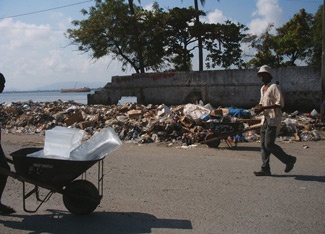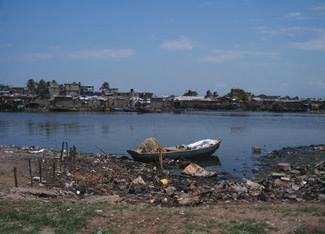|
|
Humanity has existed for thousands of years, yet we are just now beginning to experience a new kind of community—the slum community. The fact that one million people live huddled under corrugated-tin sheets in a ditch outside of Nairobi, Kenya, is something new to the human experience. Today’s slums collectively hold one billion of the earth’s people. The slums are marked by crowded conditions, makeshift housing and dubious sanitation. Overwhelming unemployment rates and desperate poverty bring despair. Despair is the most destructive force among the urban poor and is essentially a spiritual issue. When slum dwellers lose all sense of hope, they stop caring about what happens to themselves, their families and the people around them. Despair can rule the slums.
Demonstrating Christ’s Love and Power
Slum communities are on the rise at an alarming rate. It is estimated that every day there are fifty thousand new urban slum dwellers. The presence of Jesus is among these masses and hears the cries of each of the lost, poor and broken ones. He is pleading with the whole body, the Church, to respond to this spiritual, social and environmental reality as he would.
Most governments, churches and non-governmental organizations (NGOs) are at a loss to know what to do with slum communities. This provides a unique arena to demonstrate the transformative power of Christ for whole communities. Will we have the courage to follow Jesus into the heart of these communities?
Today's slums collectively hold one billion of the earth's people. The slums are marked by crowded conditions, makeshift housing and dubious sanitation.
To fail to follow Jesus into the slums, to attempt to ignore or lock out two billion slum dwellers, will put everyone on the planet at risk. The powers of radical evil are exploiting the most vulnerable who are gathered in slums and can create, for example, hot houses to nurture radical terrorism. However, this volatile environment can also provide opportunities for radical discipleship with Christ. Will the whole Church do whatever it takes to “seek the shalom of the city” in thoughtful, prayerful and committed ways? Or will the world suffer the consequences of ignoring the “least of these brothers and sisters” of God?
Understanding Slum Communities
Urban slums go by many names, according to their context. In Thailand, they are called chim choms, in Brazil they are favelas and in Argentina they are called villa iseries. What they have in common is that they are catch-basins for the poor and vulnerable of a city and nation. The rural poor, AIDS orphans, labourers and refugees pour into these makeshift towns and then they become home. Often mainstream people fearful of a community’s reputation try to hide slums away or even destroy them altogether as they reveal a reality of life few want to acknowledge.
What are slum communities? Put simply, they are communities built the wrong way around. In a regular neighbourhood a local government recognizes land as fit for housing, provides deeds and develops utilities such as sewers, water and electricity. Builders draw up building plans. Eventually foundations for homes are laid and construction starts. Once the house is completed and utilities connected, the family who buys or rents the house is able to move in their belongings and have the chance to make a home.
Slum communities begin when people move onto vacant, often undeeded, land first and put whatever belongings they have on it. Then they build whatever shelter they can quickly get over their heads. Later—if at all—utilities may be developed, and shelter is improved. Rarely are deeds granted. Over time more shanty houses pop up and more layers of infrastructure are added “over the top.”
Technically speaking, the United Nations defines a slum household as one that lacks any of the following:
- Access to improved water or access to sufficient amount of water for family use, at an affordable price, available to household members without being subject to extreme effort
- Access to improved sanitation or access to an excreta disposal system, either in the form of a private toilet or a public toilet shared with a reasonable number of people
- Security of tenure or evidence of documentation to prove secure tenure status or de facto or perceived protection from evictions
- Durability of housing or permanent and adequate structure in a non-hazardous location

|
|
Transforming Slum Communities
There are many barriers to the transformation of slum communities. They are complex and vulnerable social structures that require careful understanding if appropriate responses are to be made. If you pull what seems to be a loose thread at one end, things begin to unravel at the other end.
For example, consider the garbage collectors of Cairo, Egypt, with whom a group from Intervarsity Christian Fellowship lived for a summer. First, imagine a city growing by hundreds of thousands of people a year. How do you find housing, jobs and sanitation for such a yearly influx? The simple answer is that you don’t. Infrastructure essentially collapses; industrious poor people take advantage of the infrastructure vacuum and begin to gather trash. Soon there is a thriving garbage village right inside the city limits (there are at least five in Cairo). Within that community there is a steady source of waste for the compost with which to raise animals, so a farming complex also grows within the garbage village.
“The sights and smells of living among rubbish, animals and people were quite shocking to us at first,” said one of the group members. “Our immediate thought was, How could we work to get rid of this place? But after living there a while, we began to see how thorny the solutions become. The sanitation system is actually pretty efficient. Eighty percent of the trash in Cairo is recycled or reused because of this hands-on method of dealing with waste. In the West we bury eighty percent of our garbage. To hire a waste-management organization that would bring in heavy equipment and create massive landfills is not only worse for the environment but would also jeopardize the livelihoods of those who depend on the trash.”
Obviously, the living conditions of a garbage village are unacceptable. Humans should not suffer the kinds of sicknesses and hardships that exist in that place. But urban transformation is a tricky business. If you rescue children from working in a sweatshop, you plunge their families into even more desperate poverty. You might deliver a fifteen-year-old girl from the horrors of living in a brothel, but unless you deal with the physical, emotional, familial and spiritual consequences of child prostitution, she will return to the group of people who can relate best to her situation: the brothel from which she came. After all, she can hardly go home to the family that sold her into that life in the first place.
Seeking the Shalom of a Slum
What then are strategic places to put our energy? If the whole Church is to seek the shalom of the world’s slums then the following needs cannot be ignored in any slum.
There is the need for:
- healthy housing
- property rights
- sustainable employment
- adequate healthcare
- healthy local economies
- engaging the principalities and powers
- support of people living with AIDS and AIDS orphans
- healthy advocacy and policy
- mental health and keeping despair at bay
- healthy environment
- population control
- healthy local institutions (e.g. solidarity groups, co-ops, businesses and government)
- healthy church movements “of” the slum

Evangelisation of Urban Slums
The following are a call to action to the Church in order that urban slums might be impacted by the good news of Jesus Christ:
- For the whole Church to take seriously the need to stand in solidarity with local churches, ministries and Christians already living and serving in these slums to share Christ holistically.
- For the whole Church to take seriously the need to raise up a new generation of incarnational workers, willing to go and live among unreached urban slums, seeking holistic transformation through Christ with their new neighbours.
- For the whole Church to take seriously the need for thoughtful, prayerful and passionate advocacy in the areas of: (a) property rights of urban slum dwellers, (b) business rights of urban slum dwellers, (c) urban slum upgrades (rather than demolishing, ignoring or forcing relocation of slums) and (d) slum communities support to determine their own futures together (especially helping to provide the opportunity for the Bible and the Spirit of Christ to help guide communal decision-making).
If all three action steps are not taken seriously, the sacrificial work of slum ministry will be undermined by insecurity. For example, slums dwellers will be dispersed before transformation is an option, people will die, the image of God will be marred and the life God intends will be thwarted.
Awareness and Mobilization
As in all mission in the city, it is critical to work with the community and urban structures to eliminate slums and every depressing condition that dishonours God by degrading human life. If each church, mission agency and association of churches gave attention to the following recommendations, a huge difference would be made in reaching urban slum dwellers for Christ:
- Create awareness for the whole Church of the plight of urban slum dwellers. Few Christians know what slums are like or the needs of the slum dweller. In a city like Bangkok, for example, there are one million slum dwellers but only a handful of small churches. Who will create the media and other tools to let the church know of Jesus’ cry for the urban slum dweller?
- Identify some of the experiments in urban slum transformation and “role model” responses that others can learn from. Many churches and agencies have put urban slums in the “too hard” basket. Funding, too, is hard to maintain, as traditional responses such as child sponsorship are often unstable in slum communities. Who will create new, sustainable models and help others to reproduce them?
- Pray, mobilize, train and support a new generation of Christian slum workers from the whole Church to the whole world of urban slums. While not all Christians are called to serve in slums, many whom God has called are not being recognized or supported. With an estimated two billion urban slum dwellers by 2025 every Christian would need a good reason not to be personally involved in slum transformation. Who will go among the least of these brothers and sisters of Jesus?
- Develop solidarity between slum and non-slum Christians. For example, there could be “sister-church” or “mentoring” relationships between urban slum Christians/churches and non-urban slum Christians/churches. Who will find the bonds of friendship and solidarity with slum Christians?
Strategic alliances for Christian communities and agencies are needed so that all can take seriously the above four areas of advocacy (property rights, business rights, slum upgrades and self-determination). To make a difference in these complex areas we need such macro advocates as the Micah Challenge as well as grassroots ones such as local legal teams and activists. Who will stand with the slum dweller until “justice rolls down like a river and righteousness like a never ending stream?” Let us all rise up to be the feet and hands of Jesus to the more than one billion people living in slums around the world.
(This article was written in collaboration with Dr. Delia Nuesch-Olver of the United States, Me Evangeline Gurram Sita of India and Nakuku Imbumi of Kenya.)


